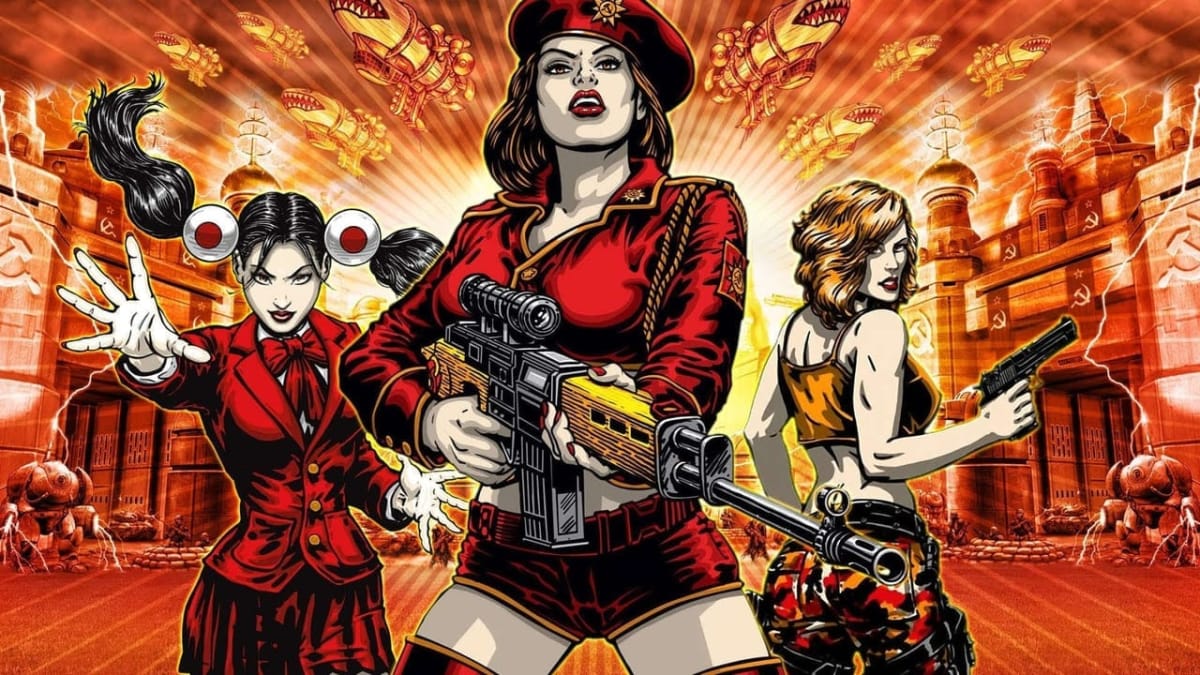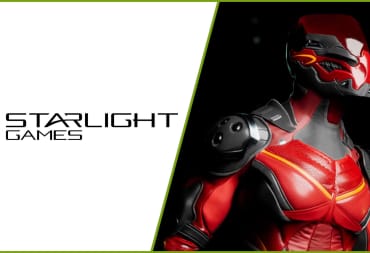Okay, kiddies, gather 'round while Grunkle-Scott talks about games from the mid-'90s. Oh, sure, Red Alert 3 came out in 2008, but the game which gave us George Takei playing a grandiosely over-the-top Japanese Emperor bent on world conquest wasn't the beginning of that grand saga, now was it?
You! Timmy! Stop whacking the dog with that funny-looking ball! Dang whippersnappers, with yer pokey-mangos and fancy handhelds! Nobody held MY hand when I was swapping IRQ jumpers on the sound card of an IBM 486! Now where was I? Oh right, right, Westwood Studios and their legendary Command & Conquer series ... specifically, the insanity which was its Red Alert spinoff.
Y'see, C&C was great and all, being about a coalition of nation-states trying to stop a ruthless terrorist organization from spreading across the world. Yes, Timmy, science fiction has a habit of predicting the future from time to time, but that's neither here nor there. What's important is that it was a huge hit for Westwood, and they were one of those companies that figured every new game they put out needed a new twist on it. Never a bunch for sitting on their laurels, the Westwood folks ...
RED ALERT: BEST PREQUEL EVER?
So 1996 rolls around, and in the honored tradition of Star Trek, they decided time travel was a pretty cool notion and nothing bad could come of it. "What if we had Einstein kill Hitler before the Nazis got into power and started invading everybody?" Well, no one thought to do the same for old Josef Stalin, so once the Soviets finally get up a head of steam, World War Two kicks off anyways.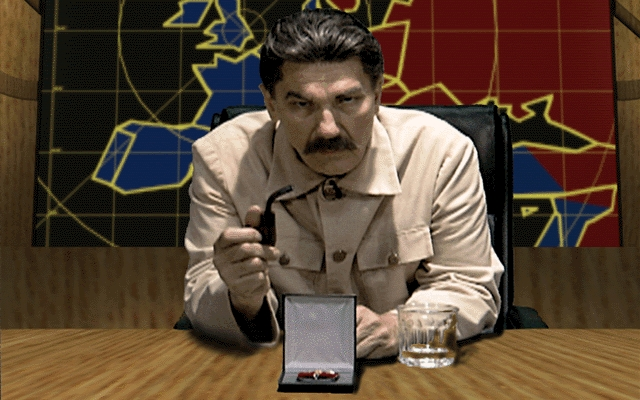
After beating up on China and taking over Eastern Europe, the USSR finally faces a significant challenger in the Western Alliance, and in you, their best available battlefield Commander. Unless you're playing the Soviet side, in which case enjoy the tanks and vodka while they last. No matter which side wins, Stalin dies and we discover each ending has set the stage for different timelines. If the Soviets win, Stalin is assassinated by his closest aide-de-camp, having been an agent for the Brotherhood of Nod all along ... as, apparently, the Soviet Commander (that being you) was too. It's never really explained what Nod gets out of taking over the Union of Soviet Socialist Republics, installing you as its supreme military authority, and then dumping everything in 1995 to launch an entirely new war for world domination in the original Command & Conquer.
But that's the prequel story, whether it makes any sense or not, and if that's as far as you wanted to take Red Alert, you'd probably be happy enough with it and this article would be pretty much done with. It'd also mean you likely never worked for Westwood Studios.
The Counterstrike and Aftermath expansion packs (remember expansion packs? Like DLC, except you had to buy a physical disc?) added plenty of new missions, maps, music, and units. Counterstrike even included secret missions where the Allies and Soviets had to fend off an invasion of giant ants! These were combined for the PlayStation 1, including all-new briefing cutscenes, into the Retaliation pack.
By the way, when Red Alert 3 launched, Electronic Arts released RA1 as freeware, so whether you want single-player or an online battle community that's still going strong, it's there for you to enjoy! There's even an open-source remake in progress, called OpenRA, which looks very promising.
But back in October of 2000, the best was yet to come ...
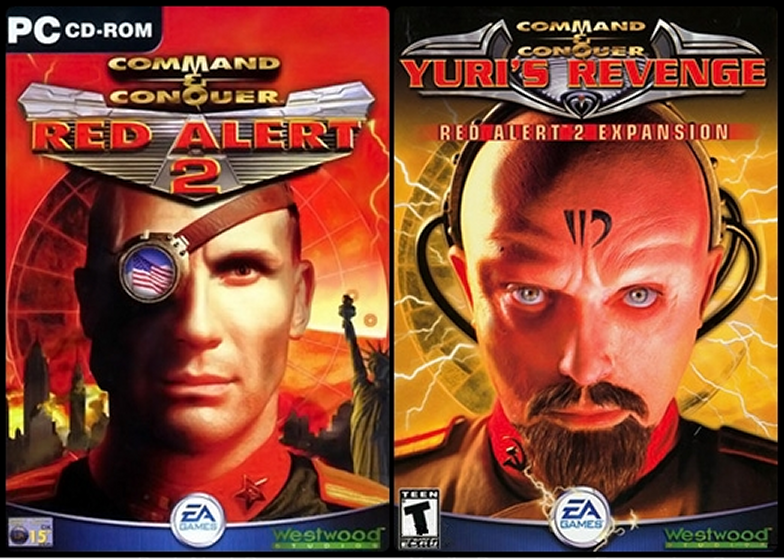
RED ALERT 2: DO YOU EVEN MIND?
Oh, did you think I wasn't going to mention what happens if the Allies win? Red Alert 2 happens if the Allies win.Unable to control such a vast region as the Soviet Union, they settle for installing a puppet Premier: Alexander Romanov, distantly related to the old Czarist aristocracy. Playing the obsequious servant at first, Romanov slowly rebuilds the Soviet military, culminating in 1972 with a three-pronged invasion of the United States. Key to this effort is Yuri, Romanov's top advisor and head of the Soviet Psychic Corps, which disables the American nuclear response by forcing silo officers to launch their missiles with the doors still closed.
You may insert a "thinking outside the box" joke here. No one will think less of you. Except Yuri, but he's like that with everyone.
The "Red" campaign for Red Alert 2 starts with the invasion already in full swing, putting you in command of an attack on the Pentagon. Definitely a moral step upward from Stalin's first directive in RA1: the cold-blooded murder of every man, woman, and child in the rebellious town of Torun ... but no matter. After playing second fiddle to a hotheaded rival general, you're approached by Yuri himself, who enlists your aid in deploying Psychic Beacons on the second (and this time successful) invasion of New York City.
Yuri's influence in Soviet operations increases, while you play fire-brigade dealing with lesser nations joining the United States' feeble attempts to throw off the just and powerful yoke of the Communist International. Mechanical spiders in South Korea, Tesla technology in Paris ... these pale only in comparison to Yuri himself, taking command as Supreme Leader of Soviet Forces at the behest of glorious Comrade Premier Romanov—hang on. Was I typing something just now? No matter.
https://www.youtube.com/watch?v=BJPMrZJsH_Y
When it comes to deliberate overacting for effect, few actors top an American doing a Cold War Soviet persona ... okay, sure, there's always Bollywood. The point is, one thing that really put the Red Alert games on the map was how amazingly goofball-serious most of the cutscenes were. Sets, costumes, special effects, and dialogue all came together to create spectacles easily as memorable as the gameplay between. There's still arguments over whether Yuri's forehead-lettering should be read left-to-right ("Y-U-R") or right-to-left in proper Hebrew style ("R-O-Y").
It just goes to show that making a memorable game is the same as with any other entertainment medium: if you put passion into your work, it shines through, whether intentionally or not.
One of Westwood's better decisions for Red Alert 2, in this regard, had to have been casting Barry Corbin as General Carville—a role virtually identical to the one he played in the movie WarGames. In a game where Russkies are invading America using giant armored blimps and ship-crushing squids, where every cutscene is packed with more ham than the Hormel factory (and gloriously so), Corbin brings a touch of cowboy gravitas without quite slipping into self-parody. Yuri, played by Udo Kier, performs a similar function for the Soviet side of the cinematic coin.
https://www.youtube.com/watch?v=_aK5VbxqAwM
As far as the American side of gameplay, you've got your work as Commander cut out for you from the word "go." Delaying actions, desperate defenses, and daring raids all do little more than buy time ... but both time and space are, of course, what Professor Einstein happens to specialize in. His Chronosphere project, which barely got into limited operation by the end of World War Two, has been refined over the intervening decades to where it can reliably teleport a small army anywhere on the planet. If you can prevent the Russians from destroying it, and with it any hope for ultimate victory, that is.
That small army will be your army, and its final victory in the name of avenging Lady Liberty is yours ...
... or IS IT?
A DISH BEST SERVED COLD
Yuri's Revenge, the sole expansion pack for Red Alert 2, starts off conventionally enough (for a Westwood game). While the Allies were busy with Romanov's armies, his psychic surrogate had developed his own plans behind the scenes: a vast network of Psychic Dominators, now poised to enforce Yuri's will across the entire planet. Since he feels a need to gloat about it, instead of just do it, both the Allies and Soviets have a little time to respond, and that's where we delve directly into Parallel-Universe Land.Since there's no time for a full-fledged global counter-attack, the American gambit is all about violating time instead, an option made possible by Albert Einstein's continuing development of temporal technology. You skip back a few months, defeat Yuri's forces before they can finish developing and deploying their Dominators, and at campaign's end, both timelines collapse into one another safely. All is well ... from the American point of view.
https://www.youtube.com/watch?v=nrXbN6r78NY
On the Russian side of affairs, however, an entirely different story emerges. Their recent defeat does not sit well, so they send a force to capture the American time machine and change RA2's outcome. Their objective is to destroy the good Professor's labs, thus preventing development of his Chronosphere. Without it, no enemy troops will be teleporting into Moscow.
The Allies, unable to strike at the Soviet heart, end up on the run. It's then that Yuri, who hasn't had time to fully implement his plan, seizes control of London with a prototype Dominator. From there it's a matter of leading Soviet troops to liberate Britain, stop an attempt on Romanov's life, track Yuri's forces to a combination submarine base and rocket-launching facility, and storm the lunar surface with cosmonauts to end the campaign.
Well, not quite. Unsatisfied with being every Bond villain ever, Yuri also has a Dracula card to play, having holed up in his old Transylvanian home. A castle. Because of course he has one. Even then, he still manages to escape using the time machine, his intent being to change history in his favor (seriously, is that everyone's final answer?). At the last moment, a quick-thinking lieutenant overcharges the machine, sending Yuri to meet a hungry dinosaur instead.
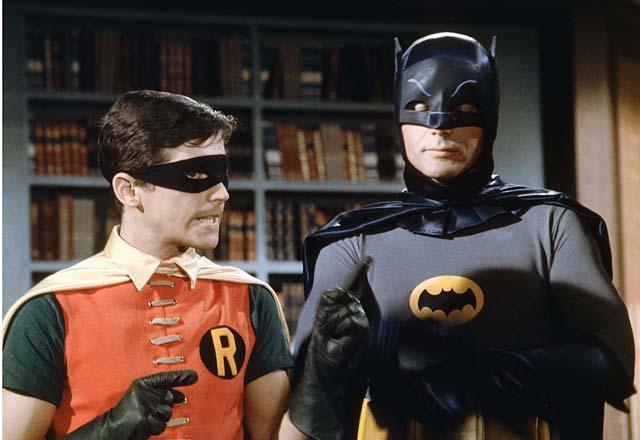
HOLY FOLDING DEVELOPMENT TIMETABLES, BATMAN!
The best part, regarding all this RA2/Revenge stuff? It's a broken-parallel universe (hyphenation intended).On first glance, Kane's Brotherhood of Nod has been entirely replaced with Yuri's Soviet Psychic Corps. Despite being virtually omnipresent in RA1's Soviet military (circa 1946) and having shadowy long-term goals stretching well in the 1990s, there's neither hide nor hair of Nod in RA2 (circa 1972). Nor is there any particular similarity, beyond the superficial, between the two groups, their leaders, and their goals. The answer was to have been found in Tiberian Incursion, intended as Westwood's third Command & Conquer game, but it died in development. Eventually, rather than incorporate these explanatory elements, Electronic Arts adopted a more simplistic "three-universe" canon.
Unsurprisingly, this is where the franchise sowed the seeds of its own eventual demise. A big part of what people like about time-travel tales are the details and implications that develop along the way. It's some of the toughest fiction to write; even tiny slip-ups can mushroom into gargantuan plot holes, and EA's "three-universe" decision left a bunch of threads dangling in the wind. One way to distract from such flaws is with a grand spectacle ... go big, or go home.
Electronic Arts decided to go big.
RED ALERT 3: THIS EMPIRE HAS NO BRAKES
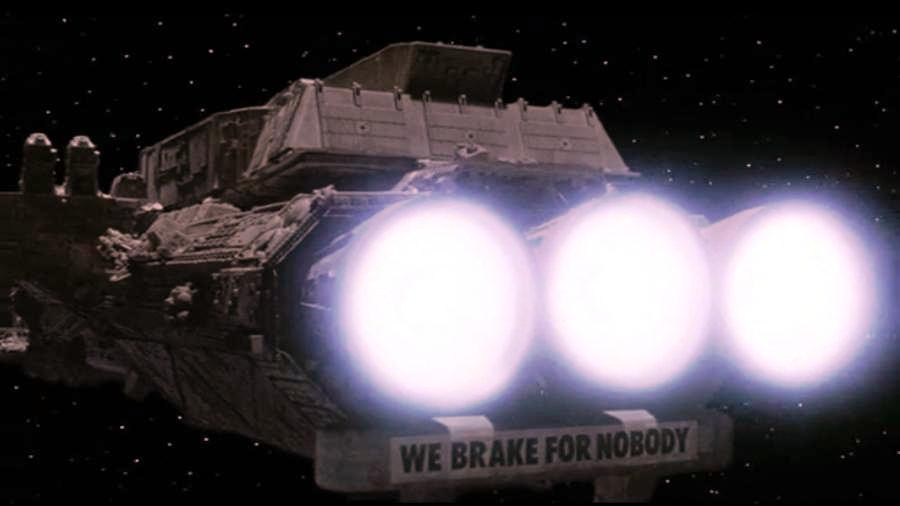
So how did Electronic Arts manage to top all the aforegoing insanity, you ask? Oh, well, just the same as with any other time-travel tale when it starts to unravel: add more time travel. Red Alert 3 picks up some time after the "merged timeline" ending of Revenge, with the Allies deciding a Soviet Union that'd already started two (and a half?) World Wars wasn't really worth keeping around.
It wasn't a bad hunch, either. The Russians had finally pilfered the fruits of American ingenuity—by which we mostly mean Einstein in this case—to develop their own time machine. They also attacked and seized an Allied base near the Danube River, leading to the Post-War Crisis (and a short-lived iPhone game). Although the Allies win this conflict, leading to the Soviet Union's collapse, they only capture one time machine ... not the spare, hidden in a basement deep beneath the Premier's office.
Seems those darn Russians just don't take losing very well, especially not when played by Tim Curry.
https://www.youtube.com/watch?v=vysnq_bf1HQ
Just over three minutes and thirty seconds. That's all it takes, before we time-travel to 1927 ...
To erase Einstein from time, the same way he'd done to Hitler in 1924 ...
Before he can develop the theories necessary to create the time-travel machine ...
Which the Russians copied from Einstein ...
So they could go back and kill Einstein. Oy vey.
Curry plays Cherdenko, the senior officer heading up the time-travel program. On returning with fellow chrononauts General Nicolai Krukov and Doctor Zelinsky, they discover that the Soviets are on the brink of victory in Europe. Additionally, for no apparent reason, Cherdenko is now Premier, and no one has ever heard of Alexander Romanov.
All of this is still sinking in when Premier Cherdenko is advised that the Japanese Empire of the Rising Sun has launched a surprise attack against Soviet holdings in the Far East. General Krukov immediately demands a full nuclear strike in retaliation, but apparently without Einstein nobody ever got around to developing nukes. Which, considering the one contribution Einstein made towards atomic weapons was with his famous mass-energy equivalency formula, in 1905, means killing him in 1927 does nothing. Screw it, let's keep this continuity rolling!
Aside from that little hiccup, it seems that erasing Einstein from history didn't undo his previous(?) erasure of Hitler—oh yeah, here comes the migraine again—as nothing else in the Red Alert timeline has changed. It's now 1986, which begs the question: what's Japan been doing for the last half-century?!
BANZAI FOR BONSAI
https://www.youtube.com/watch?v=_VAg5V56gPwIn the real world, neither Germany nor Russia had a real impact on Japan's decision to invade the Chinese mainland, which was most of their reason for going to war at all. More than anything else, Japan needed raw resources and cheap labor to keep their economy from imploding. They invaded Manchuria and set up a puppet government in 1931, after which Germany actually began providing the Chinese with economic help and military advisors. It never took Germany becoming an international menace for Japan to be one all on its own.
Nor would that affect America's attempts to pressure Japan into giving up on China. U.S. embargoes on steel and oil threatened to strangle Japanese industry, not to mention its ability to support long-term military actions. Japan's militarized government decided to force the issue with an attack on the U.S. Navy at Pearl Harbor, hoping to do enough damage to win the conflict at a single stroke.
None of these reasons or strategies disappear just because Albert Einstein does. Even if we accept that he was somehow key to the U.S. developing nuclear weapons, it just means that until he was erased, the Pacific War likely ended the same ... with the Emperor ordering surrender, shadowed by mushroom clouds. That might explain why none of the preceding Red Alert games suggest Japan is a significant military power, even though nations as relatively minor as South Korea make an appearance. And in Red Alert 2, naval missions taking place at Pearl Harbor show the USS Arizona War Memorial, verifying that just such a conflict took place.
But in Cherdenko's mangled timeline, all of Hawaii is a Japanese possession and half the Imperial Fleet is stationed there. A Pacific War that ended badly for the Americans could explain why they already have a serious war machine by 1946. The one they had in 1940, due to isolationism, was so underfunded that its troops practiced by putting "TANK" signs on trucks and giving them broom handles for rifle drills.
Red Alert's world situation does create one other important difference: absent Axis forces tying down European fleets, Japan would have no easy opportunity to seize their resource-rich Far East colonies (Indochina, Thailand, Burma, Borneo, Malaya, Singapore, Hong Kong and the Dutch East Indies). In a strictly US/Japan conflict, that would all be neutral territory.
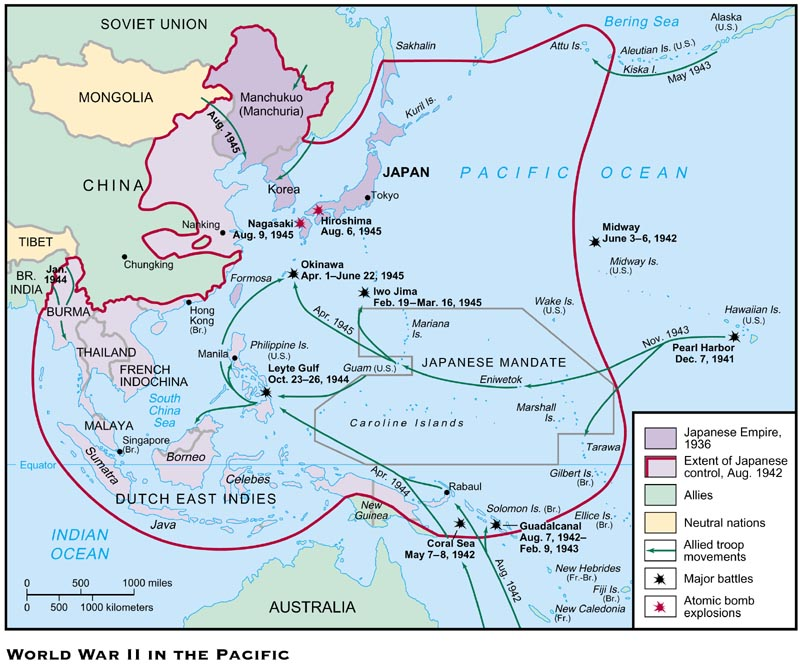
This would have greatly narrowed the scope and goals of the conflict, giving the Japanese Navy a much stronger chance to force the "early decisive battle" it sought from the beginning. Knock out enough of the American fleet to allow for a blockade of Hawaii (which was not yet an American State), and Japan might be able to sue for peace on its own terms, such as annexing the island chain and forcing a lift on the embargoes.
All of that, just to rationalize the first few minutes of a time-paradox screwball like Red Alert 3. Not that Electronic Arts gave any of this much thought, as far as anyone can tell. In fact, an EA director openly stated that the whole point was to be as "silly" as possible, which is why Red Alert 3 was always more about giant robots and samurai wielding power-swords. Which itself kind of begs the question of just when it was Japan decided to become the world's most technologically advanced civilization.
Point being that by 1986, the Empire of the Rising Sun is in full flourish, ready to spread the Imperial wisdom of George Takei to a waiting world.
STIFF UPPER LIP, WOT WOT
https://www.youtube.com/watch?v=G_XX1FF2skwNot that, as the Allied Commander, you'll have to deal with them at first. Instead, you've got to hold Britain against the Russian version of Operation Sealion, then D-Day your way to the liberation of France and the rest of Western Europe.
It's only after achieving this return to Square One that the Empire announces its intentions for world conquest ... at which point President Ackerman delivers a pointless speech about wanting to polish off the Russians because, and I quote:
"Bull-puckey! You know those Russians can't be trusted, they hate everything we stand for! Freedom, liberty, the pursuit of happiness! Apple pie ... did I say 'freedom'?"Look, speaking as a ridiculously-patriotic American myself, that was painful to listen to—never mind transcribing it. Having already lost Hawaii to the Japanese in a previous war, you'd think he'd want to avoid losing, say, California next. Wouldn't look great to the focus groups and pollsters.
So then you have to attack the President, to keep a giant laser beam, mounted in the stony skull of Theodore Roosevelt, from obliterating Moscow. Can we just elect Doctor Evil and make it official? Anyways, after that you stomp on the Japanese with one big battle for Tokyo, then it's off to fight Russians for the rest of the Allied campaign.
Some teleportation, another fight on the Moon, newly-minted-President David Hasselhoff takes his predecessor's death entirely in stride because he was a Japanese robot all along, and that's the canonical end to perhaps the most popular and revered Command & Conquer game of all time ... Red Alert 3.
AND THEN THIS HAPPENED
https://www.youtube.com/watch?v=3VzRBYRbDakLiterally the worst (and last) Red Alert installment of all time, the Uprising standalone expansion starts at the end of RA3's Allied campaign. Even the Russian and Japanese segments assume an Allied victory, and this time the Big Time-Travel Enchilada revolves around eliminating the Soviet Union from history. Plus there's a psychic Japanese schoolgirl named Yuriko, the Empire's special-ops commando from RA3.
Most of the available gameplay is wrapped up in a mode called "Commander's Challenge," a collection of fifty increasingly-difficult scenarios with no attached storyline. Compare that to a paltry thirteen for the main game, three of which are entirely focused on Yuriko. The biggest problem with this special focus is that Yuriko was easily the most-overpowered and least-iconic commando in the entire Red Alert lineup; in fact, the box art that features her character is more detailed than anything in the actual game. Despite the sudden focus on this particular character, her single cutscene appearance is a few moments of CGI with zero dialogue.
Boiling it down, Uprising amounts to a collection of afterthoughts . The campaigns are exceptionally short, the stakes are relatively small-potatoes, and it's entirely single-player—suicide for a real-time strategy game in the 21st Century. What storytelling there is seems to suggest rearranging the world situation as a set-up for Red Alert 4.
Except there is no Red Alert 4.
ENDGAME
Under Westwood Studios, Command & Conquer games sold well enough (10 million copies, worldwide) to put the company into the Guinness Book of World Records. Bought out by Electronic Arts in 1998, Westwood was officially defunct, and the last former employee on their way out, by the end of January 2003. This coincided with Command & Conquer: Generals being released as EA's third official "universe," having no connection at all to the Tiberium or Red Alert timelines.J.R.R. Tolkien's famous character, Bilbo Baggins, might have been describing the overall property at this point: "too little butter, spread across too much bread."
Despite an excellent initial showing with both critics and gamers, the only thing ever produced for Generals after that was its Zero Hour expansion pack back in 2003. For the thirteen years since, the entire line has been in development hell, vacillating between a sequel, a proposed MMO, and a total reboot altogether. EA just doesn't seem to know what to do with it.
Meanwhile, the Tiberium timeline ended up living in the shadow of Red Alert. 1999's Tiberian Sun and its 2000 expansion, Firestorm, were met with a resounding "meh" across the board, with first-person-shooter Renegade bombing outright in 2002. Tiberium Wars, the sequel to Sun, didn't arrive until 2007. It was promptly swept into near-obscurity the following year by Red Alert 3, after which Tiberium Twilight bombed even worse than Renegade in 2010.
At which point, the entire Command & Conquer property seems to have sputtered to a halt, with Electronic Arts showing little interest in either of the storylines that made it a legend. Only Generals appears to have any development support at all, and even then in the desultory fashion of someone occasionally pumping the brakes on a car coasting slowly downhill.
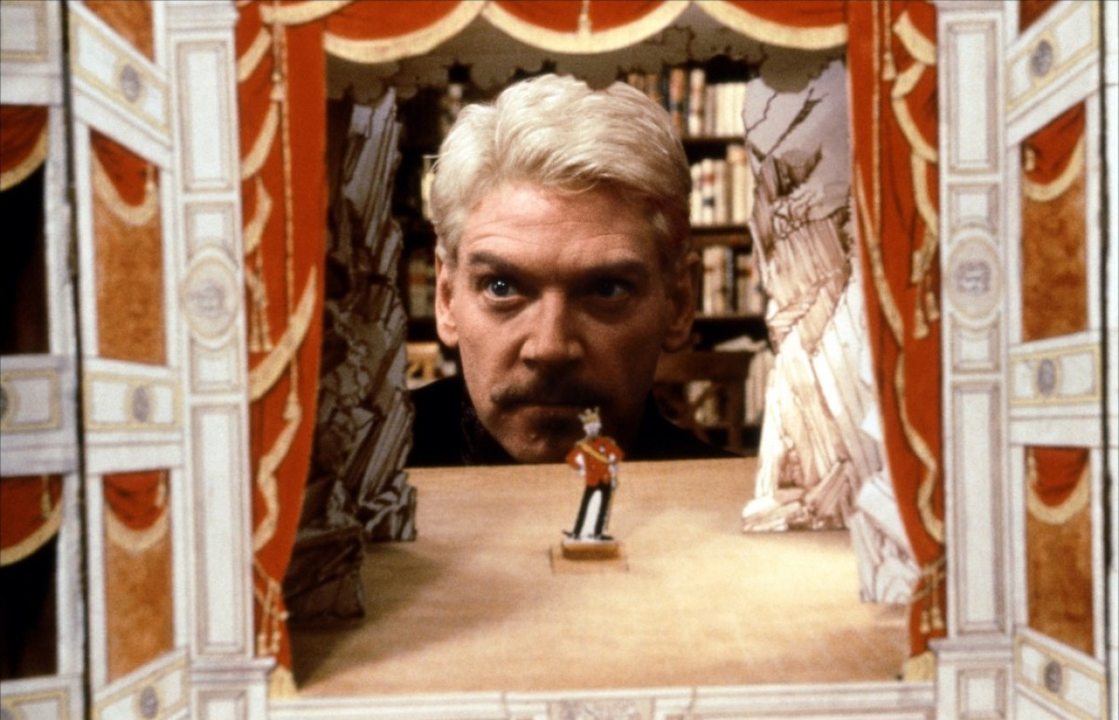
Fiction provides focus. This is especially true of videogames; you're not just developing tactics and strategems to deal with a collection of numbers on a map: you're defending Warsaw against murderous Cossack legions. You're jumping barrels to save a princess. You're running down a dark hallway to escape a nameless horror. Losing the thread of your own story also loses the focus your audience needs to remain interested.
Sloppy sequels make audiences feel their intellectual and emotional investments have been squandered, creating a sense of betrayal—even if that was never the intent. For almost the entire Command & Conquer lineup, the Metacritic ratings were up in the 80% - 90% "sweet spot"... until Red Alert: Uprising and Tiberian Twilight (both at 64%). Both of these games, the last published for their respective timelines, were the result of Electronic Arts "going big" without having much idea of where they were going.
Since 2010, the real-time strategy market has been strongly dominated by titles such as Starcraft, which, it should surprise no one, has a well-written backstory and consequently a fanbase easily as fanatical as ever there was for Red Alert. Perhaps if, one day, someone at EA rediscovers the belly-fire which once infused Command & Conquer, we shall indeed see its like again.
What do you think? Is it time for a Red Alert Renaissance? Pipe up in the comments below!
Have a tip, or want to point out something we missed? Leave a Comment or e-mail us at tips@techraptor.net
